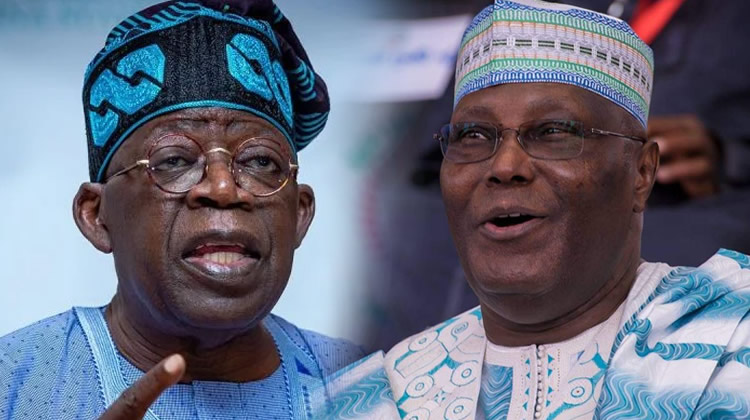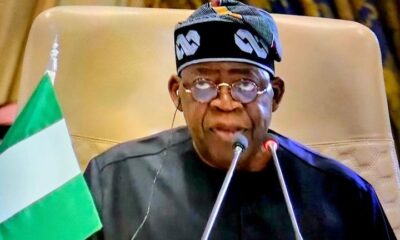Politics
Atiku Petition: Myself, Other Party Agents Signed Nasarawa Results Under Duress, Witness Tells Court

During the proceedings at the Presidential Election Petition Court (PEPC) in Abuja, Mr. Ibrahim Hamza, a witness, came forward on Monday to testify that he had been compelled under pressure to sign the presidential election results in Nasarawa state.
Mr. Hamza, the 10th Petitioners’ Witness (PW-10), testified before Justice Haruna Tsammani-led five-member panel at the PEPC, providing details about his role as a state collation agent for the Peoples Democratic Party (PDP) during the presidential election held on February 25.
In his testimony, Hamza revealed that officials from the Independent National Electoral Commission (INEC) had informed him that he would not receive a copy of the election result unless he signed it, putting him under duress to comply.
He said “Myself and other agents of the party signed the result under duress. They threatened that we would not be issued a copy unless we signed the results.”
During his testimony, the witness informed the court that there were a total of 3,256 polling units in Nasarawa state, emphasizing that the People’s Democratic Party (PDP) had agents present in all the units and wards across the state.
When presented with a copy of the presidential result from Nasarawa state, which had already been submitted as evidence, the witness alleged that it had been tampered with. He maintained that the version he had signed was a clean and unaltered copy.
According to the witness, based on the result presented in court, the Labour Party emerged as the winner of the presidential election in Nasarawa state, securing a total of 191,361 votes, which accounted for 35.40% of the total votes cast.
Hamza further informed the court that there was a system failure in the uploading process of the election results by INEC after the election took place.
Earlier in the court proceedings, Alhaji Mohammed Madaki, the Chairman of the People’s Democratic Party (PDP) in the Federal Capital Territory (FCT), disclosed that based on the “purported results” published by INEC, the PDP’s candidate, Alhaji Atiku Abubakar, did not secure the constitutionally required 25% of the votes from the FCT, Abuja.
Led by Mr. Eyitayo Jegede, SAN, counsel for Atiku Abubakar and the PDP, the witness identified Exhibit PC-37, which was the election result from the Federal Capital Territory (FCT), already presented as evidence in court.
During cross-examination by Mr. Abdullahi Aliu, counsel for INEC, the Chairman of the PDP in the FCT reiterated that according to the law, it was mandatory for a presidential candidate to secure at least 25% of the votes in the FCT to be declared the winner of the election.
Asked if he was aware that going by his position on 25% votes in the FCT, his candidate, Atiku, was not qualified to be declared winner of the presidential election, the witness, said: “Yes, by the purported result published by INEC, he is not entitled to be returned as President.”
He told the court that the normal practice was that copies of the presidential election are snapped at polling units and uploaded to INEC’s I-Rev portal.
Alhaji Madaki told the court that PDP had agents across all the polling units, adding that agents of the party also signed result of the presidential election from the FCT.
While being cross-examined by President Bola Tinubu’s lawyer, Chief Akin Olujinmi, SAN, the witness, told the court that there were a total of 2, 822 polling units in the FCT.
Also responding to questions from counsel for the All Progressives Congress, APC, Prince Lateef Fagbemi, SAN, the witness said he has lived in the FCT for over 35 years.
He told the court that he personally wrote his witness statement on oath at a business center and took the same to his lawyer for examination.
When he was presented with a document to read before the court, the witness, said he could not see the letters without his reading glasses which he said broke Sunday night.
Asked to tell the court the meaning of “conscientiously” that was contained in his statement, the witness, replied: “Honestly, I cannot remember.”
When he was asked if he was aware that there are a total of 176, 606 polling units across Nigeria, the witness, said he was not aware.
Shortly after Alhaji Madaki was discharged by the court, the ninth witness, PW-9, Mr. Abraham David, who mounted the box, told the court that he served as an agent of the PDP in the FCT, during the election.
The PW-9, told the court that Atiku, being the presidential candidate of his party, scored only 15% of votes in the FCT.
Asked under cross-examination, if he was aware that Atiku did not secure up to 25% votes in the FCT and therefore, going by argument of his party, not qualified to be returned as winner of the presidential poll, Mr. David, said: “I agree that having not score 25%, he is not entitled to be returned as President. Even Tinubu too did not also score 25%.
“If it was not wrong to return Tinubu who did not score 25%, Alhaji Atiku Abubakar can also be returned. The person that was returned by INEC did not score 25% in the FCT,” the witness insisted.
The witness informed the court that he personally visited approximately 15 polling units in the FCT during the presidential election. He stated that while he witnessed the collation process, the results were not transmitted to INEC I-Rev as mandated by the law.
The witness further alleged that the collation of the presidential result in the FCT took around three days, during which he claimed that INEC officials compromised the integrity of the electoral process.
When asked to provide the names of the INEC officials involved in the alleged electoral malpractice, the witness stated that he did not know their names.
Recall that one aspect of the joint petition filed by Atiku Abubakar and the PDP to contest the results of the presidential election was their claim that President Tinubu of the APC failed to obtain at least one-quarter of the votes cast in the FCT, Abuja.
The petitioners argued that out of the total votes cast in the FCT, which amounted to 478,652, President Tinubu received only 90,902 votes, accounting for 18.99% of the total votes.
“The Petitioners shall contend that to be declared duly elected, a candidate, in addition to obtaining not less than a quarter (25%) of the votes cast in at least two-thirds of all the States, must also receive at least one quarter (25%) of the votes cast in the FCT, Abuja, this being an additional requirement introduced by the Constitution of the Federal Republic of Nigeria 1999 (as amended), the said Constitution having clearly distinguished the FCT, Abuja as a separate entity by specific and express mention,” they added.
During the Monday proceedings, the panel led by Justice Tsammani heard the testimony of Dr. Abiye Sekibo, a former Minister of Transportation and a prominent member of the People’s Democratic Party (PDP) in Rivers state, Dr. Sekibo who appeared as the 7th Petitioners’ Witness (PW7).
During his examination-in-chief, Dr. Sekibo presented a letter of appointment issued by the PDP, appointing him as the Coordinator for the Presidential Election. The letter was admitted as evidence and marked as Exhibits PU.
Dr. Sekibo also identified Exhibit PC-32, which had already been submitted to the court, as the result of the presidential election from Rivers State as announced by INEC..
Under cross-examination, the witness insisted that Atiku won the presidential election in Rivers state, even though he accused President Tinubu and the APC of instigating violence that scared electorates away from many polling units.
Dr Sekibo, who told the court that he voted in his Local Government Area, Okirika, further alleged that the results of the election were not uploaded across about 6000 polling units in the state.
He said: “I was in my Local Government Area on the election day and I voted. I was verified, using the BVAS device.
“The accreditation took less than five minutes and I was thereafter given the ballot and I voted. I stayed for a while at my polling unit, for about 10 minutes before I left.
“Thereafter I left to see what was going on and came back to my unit when they started counting. I was there when they finished and unfortunately, the result could not be uploaded.
“The result sheet was filed in my presence and signed by party agents. I also witnesses results being collated in more than polling units at different times. There are more than 6000 polling units in Rivers state.
“In almost all the polling units, having concluded the election they could not upload. This happened across the entire state.”
Asked if he was aware that the 20 polling units he visited, out of the over 6000 polling units in the state, amounted to about 0.5%, the witness, said: “I will leave the calculation for mathematics”.
Asked to mention the names of the agents that harassed voters and stopped uploading of the results, he said; “I don’t need to know their names. But by their actions, one could know who sent them”.
On the alleged violence on the election day, Dr. Sekibo, said: “I received calls from our members that were asking to be rescued. We immediately responded and started heading to Obio/Akpor after I got the call, but we were blocked.”
When questioned about his presence at any of the Local Government Areas (LGAs) where members of his party were reportedly attacked, the witness clarified that he was not physically present at those locations.
During the cross-examination conducted by Prince Fagbemi, SAN, counsel for the APC, the witness acknowledged that the agents of his party whom he had claimed were attacked during the election were still alive.
Asked why he did not mention names of perpetrators of the violence in his statement on oath before the court, the witness, said: “I didn’t have to. What they were doing in the field showed who they were. By the action they carried out, we knew whose interest they were protecting.”
Asked if he was aware that in the 2023 elections, votes were not based on political party lines, as the PDP, won the presidential election in Katsina, Dr Sekibo, replied: “The PDP won the governorship election in Rivers State and we are saying that we also won the presidential election. I am not from Katsina”.
The witness stated to the court that he was not the individual who signed the results of the presidential election in Rivers state.
However, the court then adjourned the proceedings, with further hearings scheduled to take place on Tuesday.
Politics
Leadership Newspaper Backs Adeleke For Second Tenure, Names Him ‘Gov Of The Year’

It was a plethora of pleasantries in Osogbo on Thursday, when Osun State Governor, Senator Ademola Adeleke was named 2024 Governor of the year and endorsed for second tenure in office by the top management of the Leadership Newspaper.
The newspaper’s team was on a courtesy call on Gov Adeleke, Biztellers reports.
Receiving them at the Government House, Gov Adeleke noted that his administration had reduced the infra deficit by over 40 percent.
He added that his administration had also bridged access to primary health care, with an ambition to expand health access at medium and tertiary levels.
He said, “Osun State is constantly getting recognitions for what outsiders and even opposition members regard as our commendable performance.
“In the last one year, our government has been conferred with several awards across the sectors. Aside from reputable newspapers like the leadership stable, we have received accolades from several federal agencies and non-governmental bodies. The consensus from those reviewing our performance and service delivery is that we are true agents of good governance.
“In all these positive ratings, my response has always been to task my team to double their efforts. In the face of overwhelming positive reviews and high approval ratings, I am compelled to drive my team harder. When recently, some opposition figures confessed to our positive ratings, I still believe we have a lot of grounds to cover.
“I am not allowing the praises to enter my head. While it may be true that I have delivered a four-year task in under two years, I am propelled to do more because Osun has been left behind on many fronts. As I have reduced the infra deficit by over 40 percent, my real target Is higher. As I have bridged access to primary health care, my ambition is to also expand health access at medium and tertiary levels. While our records across the sectors are laudable as your newspaper has acknowledged, the ultimate goal is to accelerate infra upgrade alongside the boosting of soft investment for the well-being of our people.
ALSO READ: Lawmaker Introduces Bill To Allow Trump A Third Presidential Run
“I appreciate your candid endorsement of our performance. It is important to note that your yardstick for recognizing us correlates with similar reasons adduced by others. Our huge governance records are undeniable facts especially in workers’ welfare, infrastructure delivery, educational expansion, health care access improvement, solid mineral sector reforms, digital economy initiatives, agricultural mechanisation among others.
“I want to assure the public that our administration is not slowing down. Very soon, I will flag off ongoing remodeling of Osogbo stadium to assume international standard. Prior to the ongoing stadium project, we have engineered the creation of Osun Sport Commission and Osun Sport Fund through appropriate legal and policy framework.
“Very soon, I will be flagging off the dualisation of phase one of Odoori – Post office road at Iwo. The contractor for Iwo -Osogbo road has mobilized to site. We plan to complete the two projects within the life of this administration. Meanwhile, the dualisation project at Ilesa is progressing while the flyover bridge at Ile Ife is ongoing with appreciable progress. 2025 is billed to be a year of further expansion of good governance for the good of man and humanity.
On his part, the Vice Chairman of Leadership Group Mike Okpere, noted that the recognition is in order to give Gov Adeleke an insight and encouragement to do a second term.
“Your excellency you will see that, we didn’t just come down here, we had a meeting before the award and that is why we are here, so this trip is to notify you formally for this award and we personally invite you on the 8th of April at the Banquet Hall of the State House in Asokoro where this award will be handed on over to you.
“Our Reputable Person of the Year is Aliko Dangote, you all are aware of the investment he just concluded, by bringing fuel production into Nigeria, because of that and many other things, we chose him as our person of the year.
“Other person’s that would be sharing the merit are other governors that have touched people’s lives, among them is the Governor from Akwa Ibom State, the Governor of Enugu State, the Governor of Jigawa State and the Governor of Kano State.
“We didn’t call this Leadership Governor of the year, we call it Governor of the year, in other words, what we are saying is that, this recognition will give you an insight and encouragement to do a second term.
“As a newspaper company, we don’t endorse Governors but when we see something we say it, your Excellency sir, I therefore want to present this notification and official invitation”, he added.
Other members of the Leadership Newspaper team includes, Abraham Nda Isaiah, Director, Leadership Group, Ibidiran Ayokunle, Head Southern Operations, Joshua Dada, Osun State.
Politics
C’River Assembly Moves To Amend LG Law, Proposes More Political Appointments

The Cross River State House of Assembly has initiated the process to amend the Local Government Law 2007, introducing provisions to expand political appointments and enhance local government administration across the state.
The bill, sponsored by Rt. Hon. Davies Etta, representing Abi State Constituency, was debated on Tuesday in Calabar.
It proposes increasing the number of appointees in each Local Government Area (LGA) to 50. Among the new roles are 16 Special Adviser positions and a cadre of officials known as Ward Relation Officers.
According to the bill, “The Chairman of Council may appoint such a number of Special Advisers to assist him in the discharge of his duties, provided that appointments, when added to other statutory appointments, shall not exceed a total number of 50.”
The proposed Ward Relation Officers will hold ranks equivalent to Special Advisers and will report directly to the Chairmen of their respective LGAs.
This move, the Assembly says, is aimed at fostering grassroots engagement and improving governance at the local level.
Another key provision of the bill seeks to elevate the office of the Head of Local Government Administration (HOLGA) to the status of a Permanent Secretary within the state public service.
The amendment stipulates that HOLGAs will enjoy all the rights, privileges, and entitlements of Permanent Secretaries, including pensions.
“The office of the HOLGA shall be equivalent to the office of a Permanent Secretary of the State Public Service and shall enjoy all rights and privileges of the Permanent Secretary, including pensions,” the bill states.
It also specifies that appointments to the HOLGA position must be made exclusively from within the local government service in the state.
The bill, which has passed its first and second readings, has been referred to a joint committee on Local Government Affairs, Judiciary, and Public Accounts for further review and consultations with stakeholders.
Speaker of the Assembly, Rt. Hon. Elvert Ayambem, underscored the importance of the proposed amendment, noting that it would strengthen local government administration and improve service delivery to the grassroots.
The Assembly is expected to hold further deliberations before making a final decision on the proposed amendments.
Politics
Trump Completes Return To White House, As 47th US President

Donald Trump has completed his return to the White House with his inauguration as the 47th President of the United States (POTUS).
Trump’s historic return, on account of adverse weather conditions, happened with a remarkable ceremony at the Capitol Rotunda, on Monday.
In his inaugural address, President Trump outlined a bold agenda for his administration, touching on issues of gender, race, border control, economic reforms, and energy policies.
ALSO READ: CSR: Dangote Awards Scholarships To 473 Students
President Trump asserted that his administration would recognise only two genders — male and female — effectively dismissing identities such as transgender, non-binary, and genderqueer.
President Trump asserted, “This week, I will end the government policy of engineering race and gender into every aspect of public and private life. Henceforth, it will be the official policy of the United States government that there are only two genders: male and female.”
He unveiled plans to overhaul the trade system, introducing an “External Revenue Service” to collect tariffs from foreign countries, promising to shift the economic burden away from U.S. taxpayers.
“I will immediately begin the overhaul of our trade system to protect American workers and families. Instead of taxing our citizens to enrich other countries, we will tariff and tax foreign countries to enrich our citizens,” Trump stated.
The POTUS vowed to make America a “manufacturing nation” again by leveraging the country’s vast oil and gas reserves.
“America will be a manufacturing nation once again. We will use our liquid gold — oil and gas — to bring prices down, fill our reserves, and export energy worldwide. We will end the Green New Deal and revoke the electric vehicle mandate, saving our auto industry,” he said.
On border control, President Trump declared a national emergency at the southern border and announced measures to combat illegal immigration.
“All illegal entry will be halted, and we will begin the process of returning millions of criminal aliens. The Remain in Mexico policy will be reinstated, and catch-and-release practices will end. Troops will secure our borders to repel this invasion,” he announced.
He also pledged to designate cartels as foreign terrorist organizations and invoke the Alien Enemies Act of 1798 to combat criminal networks.
The POTUS announced the formation of a Department of Government Efficiency and outlined measures to tackle inflation and high costs.
He also promised an aggressive crackdown on crime, leveraging federal and state resources to eliminate gang activity.
“As commander-in-chief, I have no higher responsibility than to defend our country from threats and invasions,” President Trump added.
He recounted an assassination attempt during his campaign, framing his survival as a divine sign of his purpose to “make America great again.”
In addition, President Trump criticised America’s healthcare and education systems, promising significant reforms to address inadequacies exposed by recent natural disasters.
The event, attended by lawmakers, distinguished guests, and family members, marked the beginning of President Trump’s second term. Vice President JD Vance was also sworn in, taking the oath of office in a ceremony presided over by Supreme Court Justice Brett Kavanaugh.
It was gathered that earlier in the day, President Trump and Melania Trump met with outgoing President Joe Biden and former First Lady Jill Biden, continuing the tradition of a handover meeting between administrations.
At a pre-inauguration rally, President Trump addressed supporters, promising to pardon January 6 defendants and issuing executive orders on his first day in office.
Despite freezing temperatures, the ceremony proceeded with President Trump expressing confidence in his administration’s vision and America’s future.























